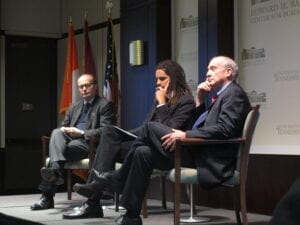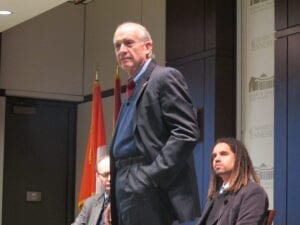Howard H. Baker Center hosts climate change discussion
The University of Tennessee hosted a discussion on climate change titled “Climate Change as a Catalyst for Conflict” at the Howard H. Baker Center Thursday, March 5.
The University of Tennessee hosted a discussion on climate change titled “Climate Change as a Catalyst for Conflict” at the Howard H. Baker Center Thursday, March 5.
Admiral Neil Morisetti and General John Castellaw headed the discussion in the Toyota Auditorium. Ben Preston, Ph.D., of the nearby Oak Ridge research facility mediated the conversation.

Morisetti is an Admiral in the British Royal Navy, while Castellaw is a retired United State Marine Corps General who now works for an agricultural equipment company.
The two men spoke about how their respective branches of the military are addressing issues that are arising from climate change.
Castellaw said our nation’s security is not just based on our military and sending people to war.
“It’s about the waterways that carry the commerce of our nation and its about the farmers that grow the food,” Castellaw said.
Admiral Morisetti discussed how the changing climate has a widespread effect.
“The physical changes that occur can affect entire nations. Things like rising sea levels and drought all put pressure on society. The reality is we live in a global world and what happens thousands of miles away still affects us,” Morisetti said.
In the last half of the discussion, the audience asked questions.


“I think that they didn’t really answer some of the questions,” UT student Abby Halliday said. “Some of their responses danced around what was asked but didn’t necessarily tackle the issue that was brought up.”
Another student, Tucker Shull, thought that the discussion showed promise.
“I thought it was good that the admiral clarified that most everyone in the UK is on board with the changes that need to be made,” Shull said. “In the United States there seems to be a disconnect between what the scientists believe and what the general public believes about global warming.”
Edited by Courtney Anderson

